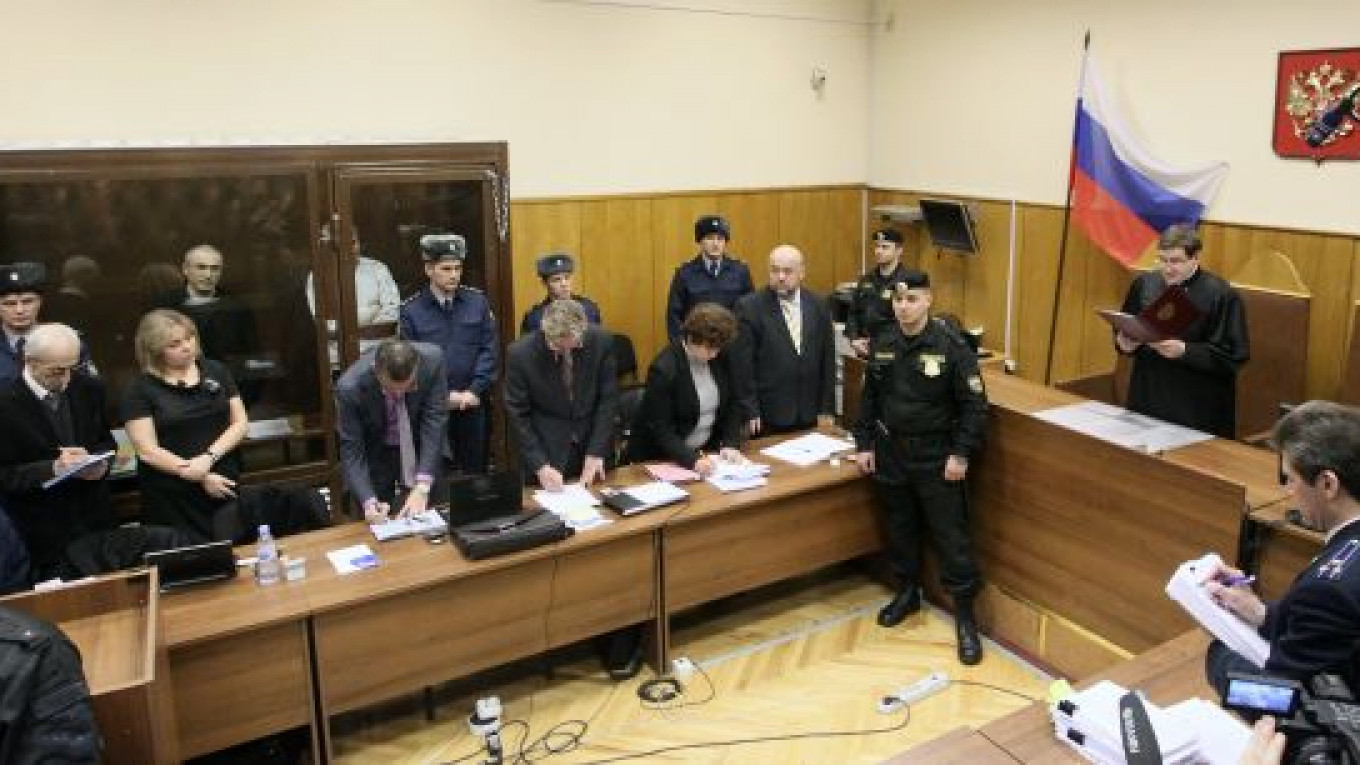President Dmitry Medvedev, who publicly scolded Prime Minister Vladimir Putin for declaring that Mikhail Khodorkovsky belonged in jail two weeks before the actual verdict, was left red-faced when the judge sided with Putin and delivered a guilty ruling.
But Medvedev could emerge the winner if support for him grows from Western governments wary of an increasingly strong Putin, analysts said Monday.
The Dec. 30 verdict — which ensures that former Yukos CEO Khodorkovsky and his business partner Platon Lebedev will remain in prison until 2017 — will not damage Medvedev's reputation as the liberal member of what he and Putin have repeatedly described as a ruling tandem, said Alexei Mukhin, an analyst at the Center for Political Information.
"It confirmed to the Western community that Putin is now holding more political power, which means that Medvedev needs more support to compete with him," Mukhin said by telephone.
He said Medvedev stands to receive more support from the West as the only viable alternative to Putin.
Khodorkovsky and Lebedev, who were serving eight-year sentences on fraud and tax evasion charges, were sentenced to six more years on Dec. 30. The ruling, which was supposed to have been announced in mid-December but was delayed without explanation, came as Russians headed off for extended New Year's holidays, ensuring that any public backlash would be minimal.
Khamovnichesky District Court judge Viktor Danilkin sentenced Khodorkovsky and Lebedev to 14 years, the jail term requested by prosecutors, for stealing some 200 million tons of oil from their company's subsidiaries and laundering the proceeds.
Neither Putin nor Medvedev had made any public comments about the sentence as of Monday, which was the last day of the extended holidays.
But Medvedev reprimanded Putin on Dec. 24, saying no top government official should comment on the Yukos trial before the verdict was announced. Putin said on his annual call-in show Dec. 16 that Khodorkovsky deserved to stay in jail. Like the first Yukos trial, the case is widely seen as revenge by Putin for Khodorkovsky's political and business ambitions.
The 14-year sentence will be counted from Khodorkovsky's 2003 arrest at a Siberian airport and include his current term in prison, meaning he would be released just ahead of the 2018 presidential election.
The decision to keep Khodorkovsky in jail has been linked by analysts to next year's presidential vote, in which Medvedev or Putin might run for election.
The guilty verdict was widely condemned in the European Union and United States, where critics saw it as driven by politics rather than the rule of law, but was silenced in Russia.
The Foreign Ministry told the EU and United States to mind their own business.
"I am very disappointed,” said Jerzy Buzek, president of the European Parliament, in a statement on Dec. 30. “The trials of Mikhail Khodorkovsky were the litmus test of how the rule of law and human rights are treated in today's Russia."
On Monday, the European Parliament's Subcommittee on Human Rights was to start discussing the verdict. It was not clear late Monday whether the case had been discussed, and a subcommittee statement announcing the planned hearing did not say what measures might be taken.
German Chancellor Angela Merkel and the U.S. State Department have also criticized the Khodorkovsky ruling.
Khodorkovsky's lawyers filed an appeal on Dec. 31.
Despite the guilty verdict, it remains within Medvedev's power to pardon Khodorkovsky. But his lawyers have said they would not ask the president for a pardon — a first step toward securing one requires an acknowledgement of guilt.
But the likelihood of a presidential pardon seems highly unlikely because Medvedev has had two years “to rehabilitate and pardon Khodorkovsky on his own initiative, using a right guaranteed by the Constitution,” said Lilia Shevtsova, a political analyst with the Carnegie Moscow Center.
She said a pardon would also empower Medvedev — something Putin would not permit. “The release of Khodorkovsky and Lebedev would mean a loosened system of rule that Putin cannot allow,” Shevtsova said by telephone.
Another possible scenario is to reduce the sentences, similar to what happened after the first Yukos trial when the two businessmen's sentences were reduced by a year.
“But even one year in a Russian prison is everlasting,” Shevtsova said.
Meanwhile, the two businessmen have urged their supporters not to lose hope.
“Platon Lebedev and I have shown by example that you cannot count on the courts to protect you from government officials in Russia,” Khodorkovsky said in a written statement. “But we have not lost hope, nor should our friends."
A Message from The Moscow Times:
Dear readers,
We are facing unprecedented challenges. Russia's Prosecutor General's Office has designated The Moscow Times as an "undesirable" organization, criminalizing our work and putting our staff at risk of prosecution. This follows our earlier unjust labeling as a "foreign agent."
These actions are direct attempts to silence independent journalism in Russia. The authorities claim our work "discredits the decisions of the Russian leadership." We see things differently: we strive to provide accurate, unbiased reporting on Russia.
We, the journalists of The Moscow Times, refuse to be silenced. But to continue our work, we need your help.
Your support, no matter how small, makes a world of difference. If you can, please support us monthly starting from just $2. It's quick to set up, and every contribution makes a significant impact.
By supporting The Moscow Times, you're defending open, independent journalism in the face of repression. Thank you for standing with us.
Remind me later.






